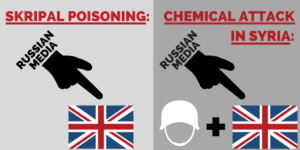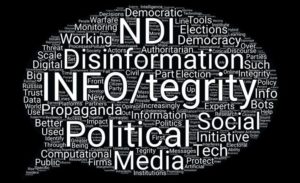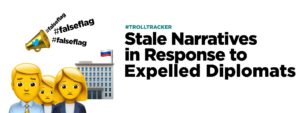When it comes to information warfare, Russia is beating the West hands down, says a leading analyst.
 The disinformation focused on the Skripal poisoning has many similarities with the Kremlin campaign following the downing of the civilian flight MH17, whereas the campaign on Syria is a predictable repetition of previous efforts discrediting civilian suffering, the EU Stratcom Task Force’s Disinformation Review reports.
The disinformation focused on the Skripal poisoning has many similarities with the Kremlin campaign following the downing of the civilian flight MH17, whereas the campaign on Syria is a predictable repetition of previous efforts discrediting civilian suffering, the EU Stratcom Task Force’s Disinformation Review reports.
Coda Story highlights the inside story of a Kremlin disinformation campaign in Georgia that is heating up because of the

EU Stratcom Task Force
Skripal case. Russian disinformation around the Syria strikes is a glimpse into the future of warfare, analysts suggest.
Russia’s neighbors are well-placed to advise Western democracies on how to counter the Kremlin’s active measures, argues Andrian Candu, speaker of the Moldovan Parliament.
What makes some people more susceptible to disinformation? Nick Monaco asks on Demworks, the blog of the National Democratic Institute, highlighting a Digital Intelligence Lab (above) paper he co-authored– State-Sponsored Trolling: How Governments are Deploying Disinformation as Part of Broader Digital Harassment Campaigns:
 In this report, we explore how governments around the world are weaponizing surveillance systems and propaganda apparatuses to intimidate and silence individuals critical of the state. State-sponsored trolling sees many problems familiar to digital rights researchers – disinformation, unlawful hacking and surveillance, the usage of bots and computational propaganda – combine and metastasize into a larger phenomenon.
In this report, we explore how governments around the world are weaponizing surveillance systems and propaganda apparatuses to intimidate and silence individuals critical of the state. State-sponsored trolling sees many problems familiar to digital rights researchers – disinformation, unlawful hacking and surveillance, the usage of bots and computational propaganda – combine and metastasize into a larger phenomenon.
Digital Resilience
 On June 22–23, 2018 the DFRLab is taking its 360/OS open source summit to Berlin, a city firmly focused on the future and a stark historical reminder of the divide between democracy and those who seek to undermine government by and for the people. Save the date for the gathering of #DigitalSherlocks from around the world building Digital Resilience ….
On June 22–23, 2018 the DFRLab is taking its 360/OS open source summit to Berlin, a city firmly focused on the future and a stark historical reminder of the divide between democracy and those who seek to undermine government by and for the people. Save the date for the gathering of #DigitalSherlocks from around the world building Digital Resilience ….
A British parliamentary committee has recommended that the government conduct further research into the manipulation of political information on social media and suggested that people of all ages receive training in digital literacy in order to recognize fake news, Reuters reports. So this initiative could not have been more timely…..
Facebook: Seeking Proposals for Global Literacy & Accessibility Challenge Grants
 Lack of literacy skills has been shown as one of the top challenges for people to adopt technologies and take part in the social communications online, Facebook writes:
Lack of literacy skills has been shown as one of the top challenges for people to adopt technologies and take part in the social communications online, Facebook writes:
Facebook is pleased to invite the academic community to respond to this call for research proposals to better understand and address global literacy and accessibility issues. Research awardees will be expected to contribute to the field of literacy and accessibility through qualitative or quantitative research, including, but not limited to:
Novel, scalable methods on assessing individual or population literacy levels.
- Understanding the experiences and challenges associated with literacy issues, eg learning disabilities or barriers due to English as a second language.
- Understanding the social, structural, and technology issues that prevent people from improving literacy skills.
- Understanding the impact of literacy skills on individuals and society.
- Digital, social technologies used to improve literacy level, especially, closing the gender gap in literacy rate.
- Design and development of technologies to elevate the literacy barrier, preferably with a focus on social and AI technologies.
Awards will be made up to $30K USD per proposal for projects up to one year in duration beginning August 2018.
Applications are now open. Applications close July 25, 2018, 11:59pm PST.
FULL DETAILS HERE.







